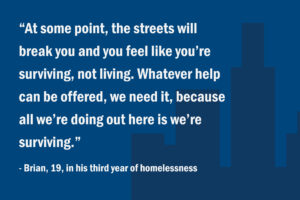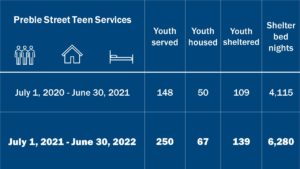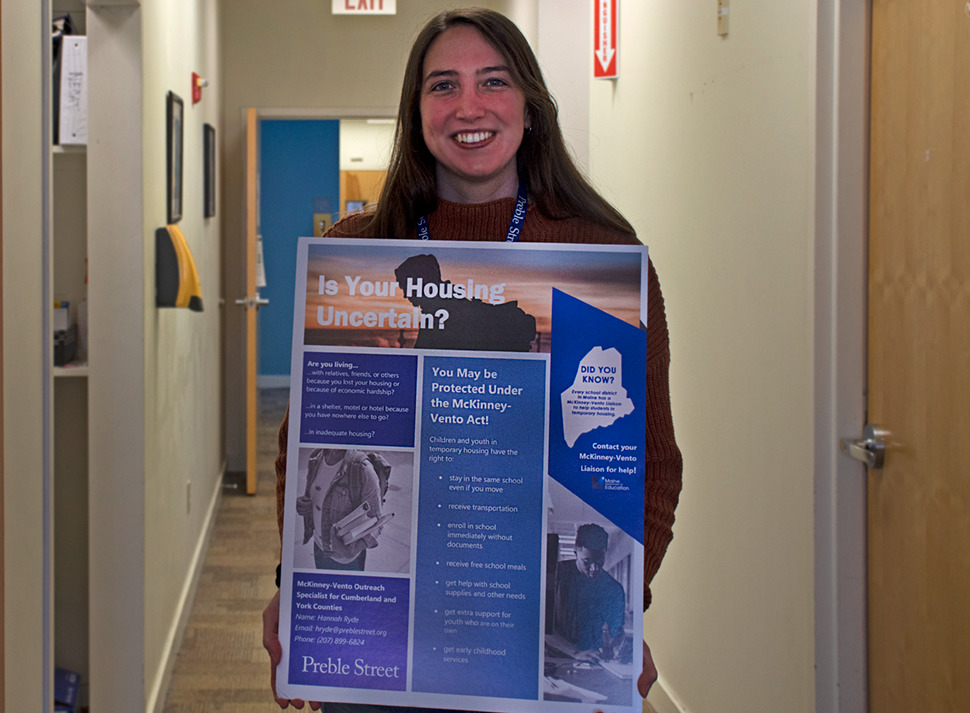A lack of housing shouldn’t be a barrier to the right to education.
Whether they’re couch surfing with friends, sleeping in a car, hotel, or motel, or staying at a shelter, at least 15,000 youth and young adults experience homelessness each year in Maine. Thankfully, schools are federally mandated by The McKinney–Vento Homeless Assistance Act of 1987 to provide support for these youth. But more people need to know about this important resource! We spoke with Hannah Ryde (she/her) Preble Street Teen Services McKinney-Vento Outreach Specialist, to learn more.
What is McKinney-Vento?
I love answering this question because it feels like most people aren’t aware of McKinney-Vento. I taught high school English for several years in Maine and didn’t know about it. Which is interesting and disappointing because not knowing about it means that we’re not doing as much as we could in terms of identifying eligible students and providing support.
The McKinney-Vento Act outlines how schools must support students experiencing homelessness. One of the key pieces is that if a student loses their housing, they can stay in the school they were attending and the school is required to provide transportation, even if they’ve moved out of district. Alternatively, a family can decide to enroll a student in the new district they’re staying in, and the school is required to enroll the student immediately even without the paperwork that would typically be required.
Schools must also help meet the basic needs of these students, from providing free meals to clothing and toiletries to access to showers and laundry. Unaccompanied homeless youth can also receive support with college and career planning, filling out financial aid forms, and things like that. Every public school district in the United States needs to have an assigned liaison who is responsible for identifying and supporting students experiencing homelessness.
What do you do in your role at Preble Street Teen Services?
The Maine Department of Education found that our state is under identifying students experiencing homelessness and provided funding to close that gap. There are four people in similar roles covering different regions of Maine. I work with all public and charter schools in York and Cumberland County, which is about 45 districts.
A big part of my job is identifying what our schools are able to provide and to help schools overcome the barriers they are running into as they work to meet the McKinney-Vento requirements. Right now, a lot of the attention is on how we can better transport students and how do we follow through on things that in practice can be difficult to implement. I connect with people across the state to help figure out how we can best support students and schools. The cool thing is that because it’s a national requirement, I’m also able to reach out to districts across the country too and see what they’re doing.
We’re also working hard to identify more students who qualify for these services and get them the resources they need, and to help spread awareness about McKinney-Vento. This includes providing training to school districts and community organizations and putting out fliers in places that these students and families may already be, like laundromats, food pantries, libraries, and community centers. If you know of a youth experiencing homelessness, please share that there is help and support through their school system.
What are your favorite parts of your job?
My office is in the Preble Street Teen Center and walking through that space is always just a good start to my day. Because I work mainly with school staff, I can sometimes feel a bit removed from the students and families I’m working to help. Chatting with youth at the Teen Center and being in that space is always very grounding.
And I will say that the people that I work with in schools are incredibly passionate and innovative. I love getting to know the different liaisons and seeing what they’re doing in their district with their understanding of their community. In Portland and more urban areas there are often more traditional social service resources, but in rural areas they are drawing more on the strength of their communities to figure out solutions or get donations.
Why are McKinney-Vento and the work surrounding it important?
All of us have youth in our communities who are experiencing homelessness, whether we realize it or not. Supporting these youth through school is really important and offers a consistency they probably don’t currently have in their lives. Ensuring they have consistent access to school offers the chance to go to a warm (or cool!) place every day, connect with peers, and to connect with adults who can offer resources. The opportunity to just go to school and have that be routine and normal means a lot for young people experiencing housing instability.
Youth experiencing homelessness have much higher rates of chronic absenteeism and lower rates of graduation than their housed peers. Supporting students so they can stay in school and access all the different resources available helps better set them up for success. A lack of housing shouldn’t be a barrier to the right to education.
Keep reading

Teen Housing and Outreach: Curbside
18-year-old Austin currently spends his nights at the Preble Street Joe Kreisler Teen Shelter or outside on the streets. “I was emancipated at 16 to get away from my family. I lived with friends for about a year and a half. When I turned 18, their parents were like ‘Ok, time to be an adult,

10 Things to Know about Youth Homelessness in Maine
November is National Homeless Youth Awareness Month. Educate yourself and your community about the issue of youth homelessness and what we can do to end it in Maine! In 2022, at least 1,500 youth and young adults experienced the tragedy of homelessness in Maine; in fact, more than 30% of Maine’s homeless population is under the age

250 youth work to reclaim their lives
We meet incredible young people through our programs — youth who, against all odds, overcome barriers and circumstances most of us could not imagine and work to reclaim their lives. Clients are the experts of their own experiences and caseworkers support them in setting and achieving their goals of independence, stability, and safety. Each of
